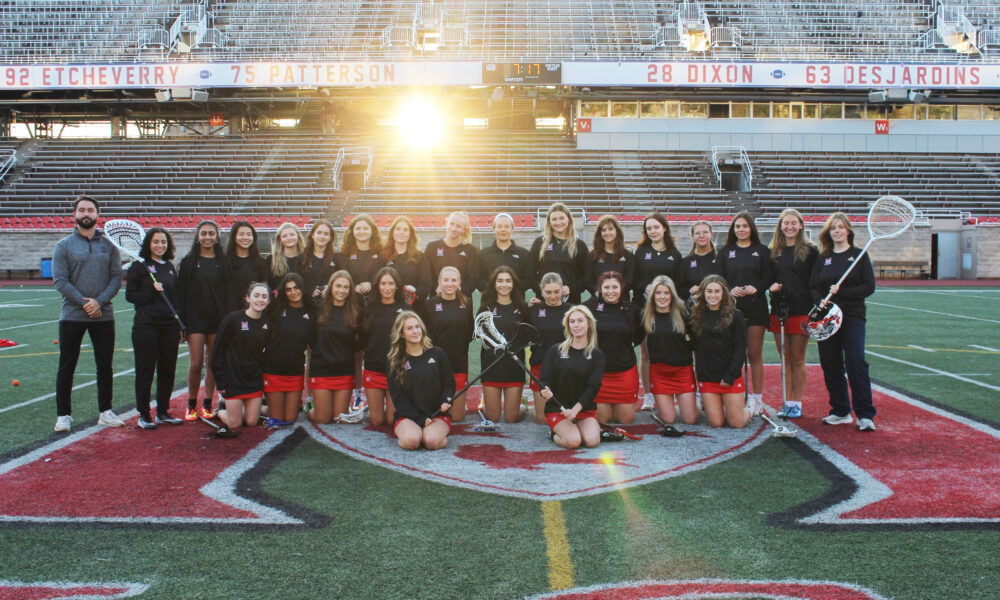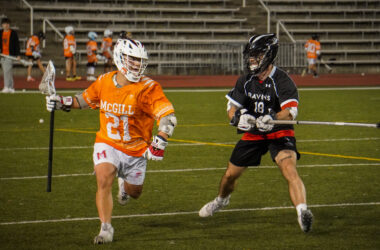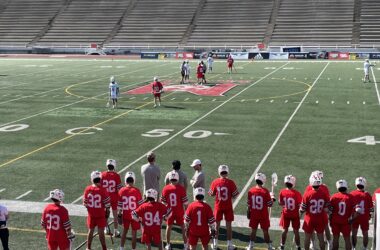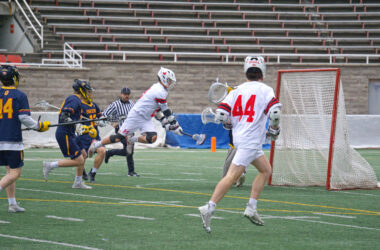Given its Indigenous origins and role as the national sport of Canada, lacrosse holds great significance for many, including players on McGill’s women’s lacrosse team. Co-captain Rachel Anderson and teammates Gemma Hauser and Olivia Maracle-Hill sat down with //The Tribune// to discuss their connection to the sport and the importance of its Indigenous history for them as Indigenous players.
The 2023-24 season was filled with great improvements for the team, both on and off the field. They raised over $4,000 in their McGill24 campaign, received their first sponsorship deal with EY consulting firm, and earned a spot playing in the Ontario University Association (OUA) lacrosse league next season.
The Martlets’ entrance into the OUA was largely due to their on-field performance throughout the 2023-24 season. The team played against universities in Ontario and the United States. One of their competitors, the Queen’s University Gaels, recognized the Martlets’ improvements during a match-up against McGill this season, indicating that they, as a club team, could compete with the best.
“We actually got praise from the Queen’s lacrosse coach, which was huge, because they won the OUA last season and defeated all the other teams in Ontario,” Anderson told //The Tribune//. “When we heard this praise, I think [it] was a turning point for us.
The team attributes much of their success to head coach Duncan Lovell. Lovell grew up playing lacrosse, eventually playing for St. Francis Xavier University. Given his experience with the men’s game––despite its different style of play and greater physicality––Lovell provides the team with a competitive edge while adapting to the women’s game. Outside Lovell’s expertise, Anderson and Hauser explain that much of the team’s improvement stems from their sheer dedication and willingness to show up and compete at every practice.
“[Compared to last season,] it just feels like everyone relies on each other more, and it’s less like you’re dragging yourself to practice because it’s an obligation,” Hauser said.
Lacrosse is more than just a game for the Martlets team. The sport holds a deeper historical and personal significance for many players.
“My own experience as an Indigenous lacrosse player has been marked by the profound connection I feel to my heritage through this sport,” Anderson said. “Lacrosse is not just a game, but a means to express our identity and honour our ancestors.”
Anderson reflects on the knowledge of her community, emphasizing the ingrained significance that lacrosse holds for many Indigenous peoples. The three teammates explain that the origin and significance of lacrosse lay deep within Indigenous history. Maracle-Hill describes lacrosse as divinely gifted by the Creator to the Haudenosaunee, which is ancestrally played and used for healing purposes. At the game’s best, players use the sport to honour the land and their ancestors’ legacy: Acting as a way of establishing Indigenous sovereignty and upholding Indigenous ways of life and being.
The players expanded on not only an issue of gender inequity within lacrosse, but also a disconnect between McGill’s stated mission of truth and reconciliation, and the role that recognizing both men’s and women’s lacrosse plays in moving toward this goal.
“The men’s [Redbirds] lacrosse team having their heritage night and having dancers and speakers and a lot of Indigenous involvement in this one game, working towards truth and reconciliation [was amazing, but] I don’t even think it would be feasible for us to do something like that,” Maracle-Hill said.
With the lack of funding and support from both the McGill administration and McGill Athletics, the Martlets feel as though the university is doing them a disservice. The team emphasizes that McGill has the opportunity to work on their stated mission to “establish McGill University as a global leader in post-secondary institutions for reconciliation with Indigenous peoples” through the game of lacrosse, particularly with the sport being played on unceded territory of the Kanien’kehá:ka (Mohawk) territory. The team hopes that if the university were to bring greater awareness to the Martlets lacrosse team––through advertising and funding––they would not only be able to thrive in the OUA but demonstrate the significance of their sport because as Anderson says “[lacrosse] is more than just a game to us.”









